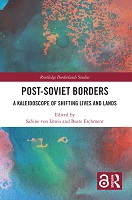Chapter 2 Between the ‘Opening to the West’ and the Trauma of Rebordering
Proposal review
Towards a Genealogy of Post- Soviet Border Studies
Abstract
After the dissolution of the USSR, the new post-Soviet borders became a valuable research laboratory both for social scientists from the region and international scholars. Persisting Soviet legacies, on the one hand, and the continuing re-bordering processes in the post-Soviet space, on the other, make post-Soviet borders an object of enduring scholarly interest and constitute post-Soviet border studies as a specific research field. This chapter outlines the contours of this multidisciplinary field and seeks to map its main research institutions, projects, and publications in multiple political, geographic, and academic contexts. It identifies regional ‘schools’ of border studies in the post-Soviet space as well as their origins. The chapter argues that the institutionalisation of border studies in the post-Soviet context has been closely connected, first, to the new geopolitical imaginaries of the post-Cold War era and, second, to some important paradigmatic shifts in social sciences that arrived in post-Soviet academia in the 1990s.
Book
Post-Soviet BordersKeywords
USSR; post-soviet borders; re-borderingDOI
10.4324/9781003169376-4ISBN
9780367770082, 9780367770105, 9781003169376Publisher
Taylor & FrancisPublisher website
https://taylorandfrancis.com/Publication date and place
2023Imprint
RoutledgeClassification
Development studies


 Download
Download